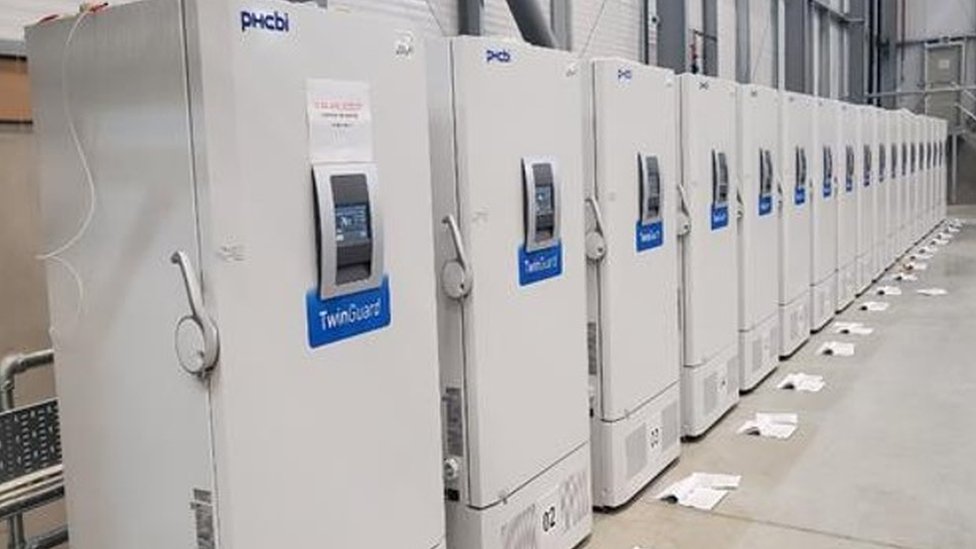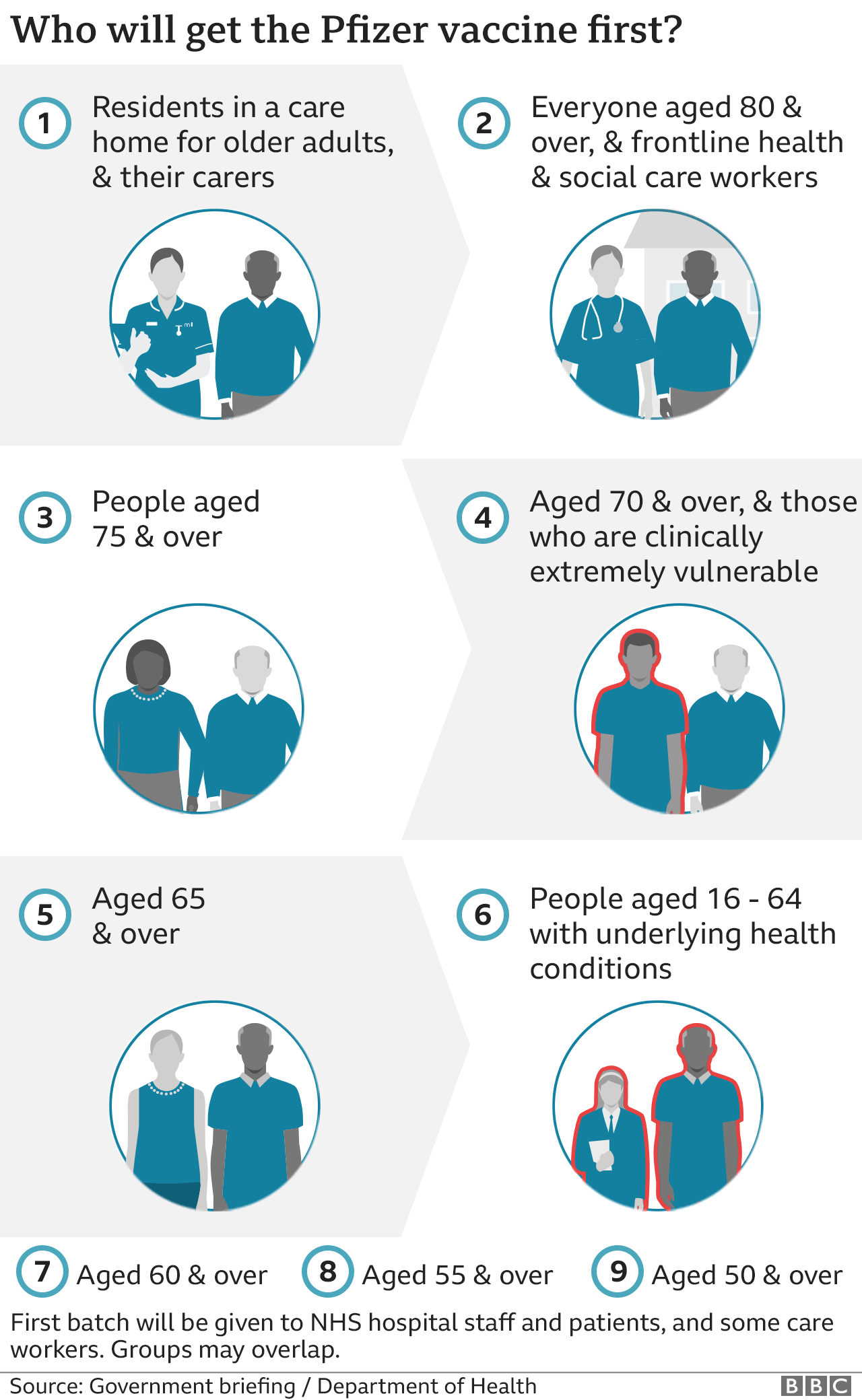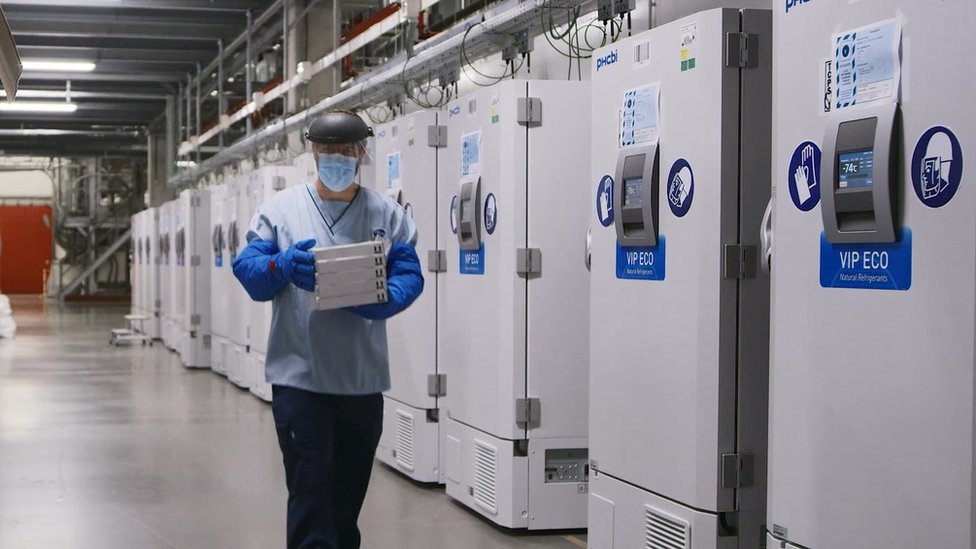Coronavirus: NHS to begin vaccine rollout this week

Public Heath England/PA Wire
The NHS will begin what it has termed the largest-ever vaccine rollout in UK history on Tuesday, the Department of Health has said.
Frontline health staff, people over the age of 80 and care home workers will be first to get the Covid-19 vaccine.
In England, 50 hospitals have been initially chosen to serve as hubs for administering the vaccine.
Health Secretary Matt Hancock described the start of the vaccination scheme as “a historic moment”.
“I urge everybody to play their part to suppress this virus and follow the local restrictions to protect the NHS while they carry out this crucial work,” he said.
Refrigerated containers holding the vaccine doses have been arriving in the UK from Belgium, and are being prepared to be moved from secure locations to the hospitals.
Prof Stephen Powis, NHS national medical director, said despite “huge complexities”, the first doses would arrive at hospitals on Monday, to be ready to administer from Tuesday.
“The NHS has a strong record of delivering large scale vaccination programmes – from the flu jab, HPV vaccine and lifesaving MMR jabs,” he said.
Scotland, Wales, and Northern Ireland will also begin their vaccination programmes from hospitals on Tuesday.
- What are the safety checks for vaccines
- How will I get a vaccine?
- NHS staff: ‘Vaccine is a game changer’
The first consignment of the Pfizer/BioNTech coronavirus vaccine arrived in the UK last Thursday.
About 800,000 doses of the vaccine are expected to be available in the UK from next week.
So far the government has ordered a total of 40m doses – enough to vaccinate 20m people, with two shots each, 21 days apart.
With limited quantities initially available, elderly people who are already attending hospital as an outpatient, as well as those who are being discharged home after a hospital stay, will be among the first to receive the jab.
Others over the age of 80 will be invited to attend the hospital “hubs” to receive a jab, and care home providers will be able to book their staff into vaccination clinics.
Any appointments not used for these groups will be used for healthcare workers who are at highest risk of serious illness from the virus.

Dr June Raine, chief executive of the Medicines and Healthcare products Regulatory Agency (MHRA), said people could have “real confidence” in the vaccine, adding: “The highest standards of scrutiny, of safety and of effectiveness and quality have been met, international standards.”
She also said the MHRA would also be “following up all the safety issues after rollout incredibly carefully. Our job doesn’t end when rollout starts.”
Speaking on the BBC’s Andrew Marr Show, Dr Raine vowed the vaccine will reach everyone in the UK who needs it – whatever the outcome of post-Brexit trade talks, saying officials were “fully prepared”.
The Pfizer vaccine needs to be stored at around -70C and moved carefully, so at first it will only be administered from 50 specific hospital “hubs”.
NHS England says as more doses of the vaccine arrive more hubs will be set up.
Thousands of GPs and primary care staff are on stand-by to deliver vaccinations in coming days, followed by a plan for mass distribution in pharmacies, sporting venues and conference centres.
Because the Pfizer vaccine needs to stored and moved carefully each container is being inspected to ensure the vaccine vials have reached the UK in perfect condition.
Tracking data covering every box’s journey from Belgium is being downloaded to check that the vials have been kept well below freezing.
The boxes each contain five packs of 975 doses, and will be split into smaller packs to be distributed around the country and defrosted.

Although care home residents and staff are top of the priority list agreed by the Joint Committee on Vaccination and Immunisation (JCVI), they may not get the vaccine first “for operational reasons”.,
Prof Anthony Harnden – deputy chair of the JCVI – told the BBC on Friday said the committee would “closely monitor” delivery and stressed he still expected care home residents “to be prioritised”.
Mr Hancock said the government was doing everything it could to overcome “significant challenges” to ensure care home residents were vaccinated as soon as possible.
Speaking to the Sunday Telegraph, the health secretary said fast-track approval of the Covid jab meant restrictions might be relaxed before the end of March next year.
As well as the challenge of delivering the vaccine, health experts are also conscious that the public needs to be educated and persuaded to support the vaccination programme.
A host of famous faces including chat show host Sir Michael Parkinson and the singer Lulu, have told the Sunday Mirror that they will take the coronavirus vaccine without hesitation.
It follows concerns that online misinformation about vaccines could turn some people against being vaccinated.
The Mail on Sunday reports that the Queen is expected to receive the vaccine “within weeks” before revealing she has had it to boost public take-up of the jab.
The paper quotes senior sources who say the 94-year-old monarch and her husband, the Duke of Edinburgh, 99, will not get “preferential treatment” and will “wait in line” during the first wave of jabs reserved for the over-80s and care home residents.

- TESTING: How do I get a virus test?
- SYMPTOMS: What are they and how to guard against them?
- LOOK-UP TOOL: How many cases in your area?
- LOCKDOWN LOOK-UP: The rules in your area
- THE R NUMBER: What it means and why it matters


- COVID-19 VACCINE: Professor Van-Tam answers your questions
- THE HOME OF PEAKY BLINDERS: Watch every episode of the iconic crime drama on BBC iPlayer

Published at Sun, 06 Dec 2020 13:48:08 +0000





Comments
Loading…